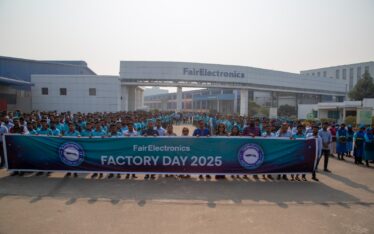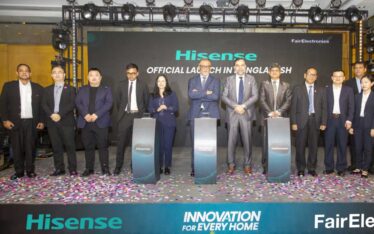Bangladeshi mobile phone assemblers have the potential to become a leading technology products exporter if the government provides effective and consistent policy support, said a local entrepreneur.
Ruhul Alam Al-Mahbub Manik, chairman of Fair Group, has established a plant in Narsingdi where Samsung-branded products are being assembled.
Apart from mobile handsets, the group is assembling refrigerators, microwave ovens and some other home appliances in the plant where Samsung—a Korean giant—is providing technological assistance to ensure global standards.
“My dream is to make Bangladesh a manufacturing hub for digital products and for that we need policy support,” he told The Daily Star in an interview recently.
But his dream is under serious threat following the government’s change of heart.

Ruhul Alam Al-Mahbub Manik
Manik, also the president of the Bangladesh Mobile Phone Importers Association, said the government formulated a policy last year and granted some benefits, paving the way for assembling mobile handsets locally.
But on June 7 this year, the National Board of Revenue (NBR) came up with a statutory regulatory order that dealt a serious blow to the assemblers’ plan.
According to the order, every plant must add 30 percent value and have the capacity to manufacture five components of a mobile phone such as printed circuit board, charger, battery, and casing in its plant in order to gain tax benefits.
But companies such as Apple, Samsung or Huawei do not manufacture component on their plants; rather they do assembling by bringing in high quality components from different companies and from different countries.
Besides, no mobile handset maker in the world manufactures batteries or chargers at their plants, said Manik.
According to the amended order of the NBR, companies like Apple will not be eligible to get manufacturing licences from Bangladesh as it collects components from others, including Samsung, he said.
“The order has given a negative signal to the technology world,” Manik said.
“Assemblers need a consistent policy for the next three to five years at least,” he said.
At least six assemblers, including some global players, may find it difficult to keep running their plants in Bangladesh due to the new order, he said.
Samsung assembled 100,000 fourth-generation (4G) mobile handsets in the Fair Group’s plant and had planned to release them in the market before Eid-ul-Fitr, but it had to shelve the plan because of the NBR order.
“Actually, the order came like a bolt from the blue and now we are struggling to finalise our next course of action,” said Manik.
According to the entrepreneur, the NBR move has also deprived the local customers of the scope to use Samsung 4G sets assembled in Bangladesh.
Manik also gave the example of India where mobile assembling started eight years ago and value addition there has reached 7 percent to 10 percent so far.
Now global companies are entering the country to manufacture components for themselves as well as for their competitors.
The value addition of China, known as the world’s largest assembler, is about 25 percent, Manik added.
“So, it is totally illogical for the NBR to order us to add 30 percent value.”
If any assembler fails to meet the criteria, a 15 percent VAT will be slapped on the phones they produce, according to the NBR order.
The tax for local manufacturers will be 13 percent if they meet all of the 10 conditions set by the NBR.
The tax incidence will be about 34.2 percent if the 15 percent new VAT is added — a rate that will make local assembly unprofitable as the import tariff for mobile handsets is 31.1 percent.
“How will the mobile assembly plant owners survive if the import tariff is lower than that of local manufacturing?” Manik asked.
“The new tax structure will increase the cost of production and might even lead to the closure of plants. Even the people who have been considering to set up mobile phone assembly plants will discard their plans.”
Manik said the inconsistency in policy will hurt the mobile industry and the country in the long run and the government will find no new investors in the future.
Around 3.34 crore pieces of mobile sets worth of Tk 10,000 crore were imported in Bangladesh in 2017.








